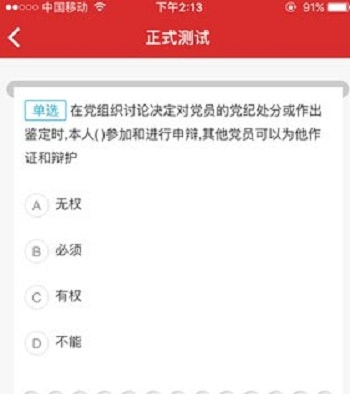China evaluates the performance of 90 million party members by phone
At least 10% of Chinese Communist Party members will be assessed through mobile apps specifically designed for them.
 |
A series of mobile applications related to the Chinese Communist Party have been developed in China recently. Photo: Global Times. |
Every morning, Sui, a Chinese official, logs on to her mobile phone. She doesn’t chat with friends, but writes reports on the app. Sui also learns a lot about the Communist Party of China (CPC) through this app, which is specially designed to manage and train party members in China, according to the Global Times.
In addition to the local government in Hunan province, where Sui works, other party agencies are also using mobile apps to monitor and evaluate party members’ performance. Demand for the apps is growing ahead of the upcoming party congress, service providers said.
The apps not only provide online courses to learn party doctrine, but also allow users to pay party membership fees and expand social connections. More importantly, the apps will help the CPC evaluate the performance of its nearly 90 million party members in an intuitive, accessible and interactive way.
The most basic function of these apps is to provide members with materials on party knowledge and regulations, as well as help party members follow the latest news about senior party leaders, app developers said.
Among these documents, the speeches of Chinese President Xi Jinping, who is also general secretary of the CPC Central Committee, are the most widely read.
For customers (ie thegrassroots party organizations), one of the most popular features of more than 100 party-building apps is the ability to evaluate the performance of users (i.e., party members managed by these organizations). Evaluation criteria include user engagement, such as how often they use the app, how many online courses they take, and how often they log in to use online activities.
All party members' activities are displayed on the app, providing proof of their use, explained Zeng Ying, project manager at Fujian Huayu Education Technology Company.
Some apps also have tests to assess party knowledge, such as "What should party members do to have proper working style?" The test results affect user evaluations on the app and in reality.
An app developed specifically for construction company CTCE also ranks users monthly and weekly based on study habits and test results, said Wang Shizhou, head of CTCE's organization department.
Those who fail or do poorly will be criticized, while those who do well will be awarded points, helping them move up the ranks or exchanging points for rewards like laptops or pens, Wang said.
He added that the company is developing a new version that will allow users to vote for the 10 best party members of the year from among the company's 10,000 candidates.
For companies like CTCE, whose employees work mainly on construction sites across China, it is difficult and costly to bring all employees together in one place for training or voting.“A smart app would effectively solve these problems,” Wang said.
Another popular and effective application is the "Party Member's School Bag," said Wang Tong, deputy party secretary of the People's Publishing House.
The app is used in remote areas like Ai County in the Tibet Autonomous Region. Party members in this area live and work scattered across the Qinghai-Tibet Plateau. The app makes it easier for them to study party information or hold online meetings, Wang Tong said.
The "Party Member's Schoolbag" is being used by 1,244 customers who are Chinese state agencies, including the State Administration of Press, Publication, Radio, Film and Television, and the CPC Central Committee in Yan'an, Shaanxi Province.
Another app designed for CPC members in Laizhou, Yantai, Shandong province, introduces agricultural specialties and tourist attractions along with specific contact information. The app aims to help Laizhou, which has 60,000 party members and 70 percent of whom are farmers, develop the local economy, Zeng said.
These apps, which cost thousands to millions of yuan (one million yuan equals 152,000 USD) to develop and maintain, are mostly designed for CPC committees at different levels and for party organizations in social units such as enterprises or universities.
According to service providers, most of the applications are available online and can be downloaded easily. However, non-party members can only log in with a visitor account and can only use a limited number of functions.
 |
A multiple choice question about the party's charter on a mobile app. Photo: Global Times. |
Experience
Many apps that are only available to party members also provide social communication channels for users with similar functions to WeChat (China’s largest social media app). They can search for and make friends with party members who are far away, or organize online meetings through the app.
Ahead of the 19th National Party Congress to be held on October 18, demand for these apps is growing rapidly, Zeng said.
Since no party member wants to fall behind in party work, these apps also put more pressure on party members to properly and promptly demonstrate their loyalty and enthusiasm for the party, according to Professor Sui Wei, an expert at the Chongqing Party Academy.
Although developers and customers appreciate the efficiency and convenience of these applications, party members have mixed opinions about these applications.
"I feel motivated to spend more time and effort studying the party knowledge contained in the app," said Chen Lixia, a party member from Henan province.
However, there are also opinions that forcing the download and use of these applications puts more work burden on party members. In addition, conducting checks via applications does not ensure honesty.
"Users can simply pay someone to take the test for them to get a high score, or easily find the answers online," Sui said.
"Using the Internet and big data to help build the party is a trend, bringing many conveniences to management in local party committees. However, this should not be seen as competition. These applications should avoid distorting the purpose of party building," Su said.
By the end of 2016, China had a total of 89.44 million CPC members, managed by 4.5 million grassroots party organizations. China's ruling party spends a lot of time monitoring the activities of its members.
According to VNE
| RELATED NEWS |
|---|
